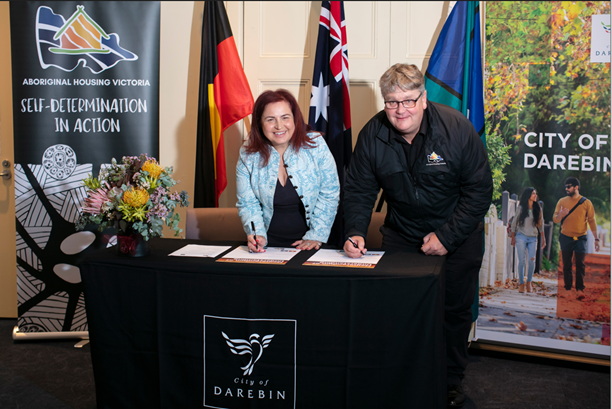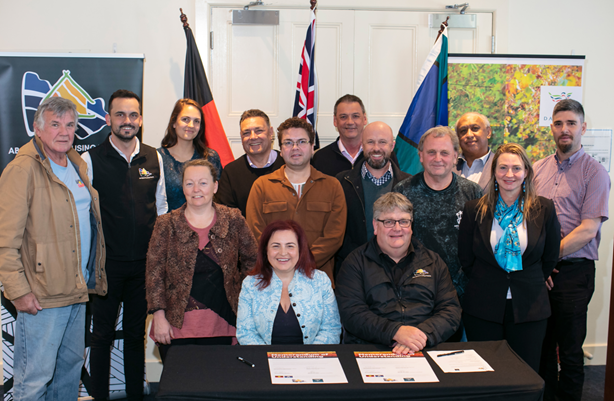Initiative to improve Aboriginal housing in Darebin and beyond
Every person deserves a home, and in Australia, none more so than Aboriginal and Torres Strait Islander Peoples, the First Nations Peoples of this land, whose sovereignty was never ceded.
In recognition and support of this, Darebin Council and Aboriginal Housing Victoria (AHV) are proud to sign a Memorandum of Understanding (MOU) to improve access to housing for Aboriginal and Torres Strait Islander people living in Darebin.
The MOU is the first of its kind in Victoria, and in signing it, Darebin and AHV put the call out to all other Councils, Aboriginal Community Controlled Organisations (ACCO’s) and Traditional Owner Groups across Victoria to follow this lead to improve access to housing for Aboriginal and Torres Strait Islander people living right across the state.
Council and AHV, in consultation with the Darebin Aboriginal Advisory Committee (DAAC), have finalised the MOU, with accompanying action plan as a pilot for local governments throughout Victoria.

“Council is leading the way through this MOU, in its support of our Aboriginal and Torres Strait Islander community including identifying parcels of vacant land that may be suitable for social or affordable housing and facilitate their development, as well as encouraging developers to work with AHV on projects to include social and affordable housing,” Darebin Mayor Cr Lina Messina says.
“We’re also proud to offer rate concessions for all AHV properties in Darebin and provide practical support for people living in AHV properties to increase participation and inclusion in our services and programs,” Cr Messina says.
AHV CEO Darren Smith says the 2020 Aboriginal Housing and Homelessness Framework, Mana-na woorn-tyeen maar-takoort, found an additional 27,000 properties would be needed to house Aboriginal households by 2036.
“Currently, one in six Aboriginal Victorians need homelessness assistance and Aboriginal Victorians are 10 times more likely to depend on social housing than other Victorians. They are also 25 per cent less likely to purchase their own home,” Mr Smith says.
“This is unacceptable. Every level of government needs to be working to resolve this, including local government. Rates are a significant operational cost for AHV. If councils waived or reduced our rates, we could reinvest that money into more housing for more Aboriginal Victorians.”
The AHV goal is not just limited to social housing but includes ensuring Aboriginal people have equal access to the full housing spectrum of private rental and home ownership.

“Darebin has shown real leadership on this issue and we are hopeful that other local governments will see the positive impact of this MOU and work with us to help deliver on the Mana-na woorn-tyeen Maar-takkort vision - Every Aboriginal Person Has a Home,” Mr Smith says.
DAAC has developed a strong model of representation and advocacy with Darebin Council over many years, and they have been central to the MOU negotiation process. DAAC Chair Uncle Alan Brown says, “Our focus is on ensuring this MOU improves the quality of life of people renting AHV properties in Darebin”.
“We will hold the parties accountable. It must be more than a piece of paper, or the ticking of a box.”
Now that this MOU has been signed, Darebin and AHV call on other Victorian Councils and Aboriginal Community Controlled Organisations and Traditional Owner groups to follow their lead.
For more information on this project:
E. Ellie Cope - Ellie.Cope@darebin.vic.gov.au
W. www.darebin.vic.gov.au
